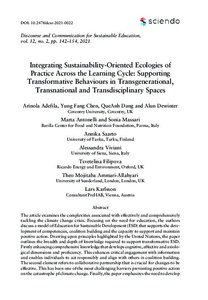Integrating Sustainability-Oriented Ecologies of Practice Across the Learning Cycle: Supporting Transformative Behaviours in Transgenerational, Transnational and Transdisciplinary Spaces
Adefila Arinola; Chen Yung Fang; Dang QueAnh; DeWinter Alun; Antonelli Marta; Massari Sonia; Saarto Annika; Viviani Alessandra; Filipova Tsvetelina; Ammari-Allahyari Theo Mojitaba; Karlsson Lars
https://urn.fi/URN:NBN:fi-fe2022081154250
Tiivistelmä
The article examines the complexities associated with effectively and comprehensively tackling the climate change crisis. Focusing on the need for education, the authors discuss a model of Education for Sustainable Development (ESD) that supports the development of competencies, coalition building and the capacity to support and maintain positive action. Drawing upon principles highlighted by the United Nations, the paper outlines the breadth and depth of knowledge required to support transformative ESD. Firstly enhancing comprehensive knowledge that develops cognitive, affective and axiological dimensions and proficiency. This enhances critical engagement with information and enables individuals to act responsibly and align with others in coalition building. The second element refers to collaborative partnership that is crucial for changes to be effective. This has been one of the most challenging barriers preventing positive action on the catastrophe pf climate change. Finally, the paper emphasizes the need to develop the competencies for supporting collective action, which will enable sustained action across transnational, transdisciplinary and transnational boundaries.
Kokoelmat
- Rinnakkaistallenteet [29335]
